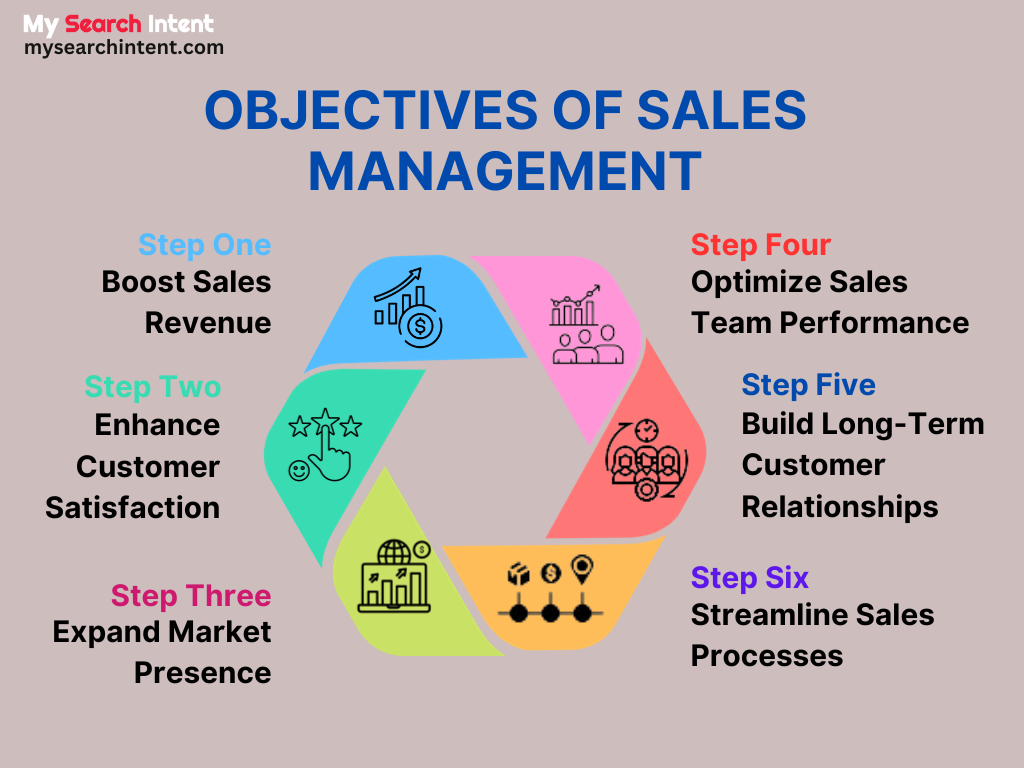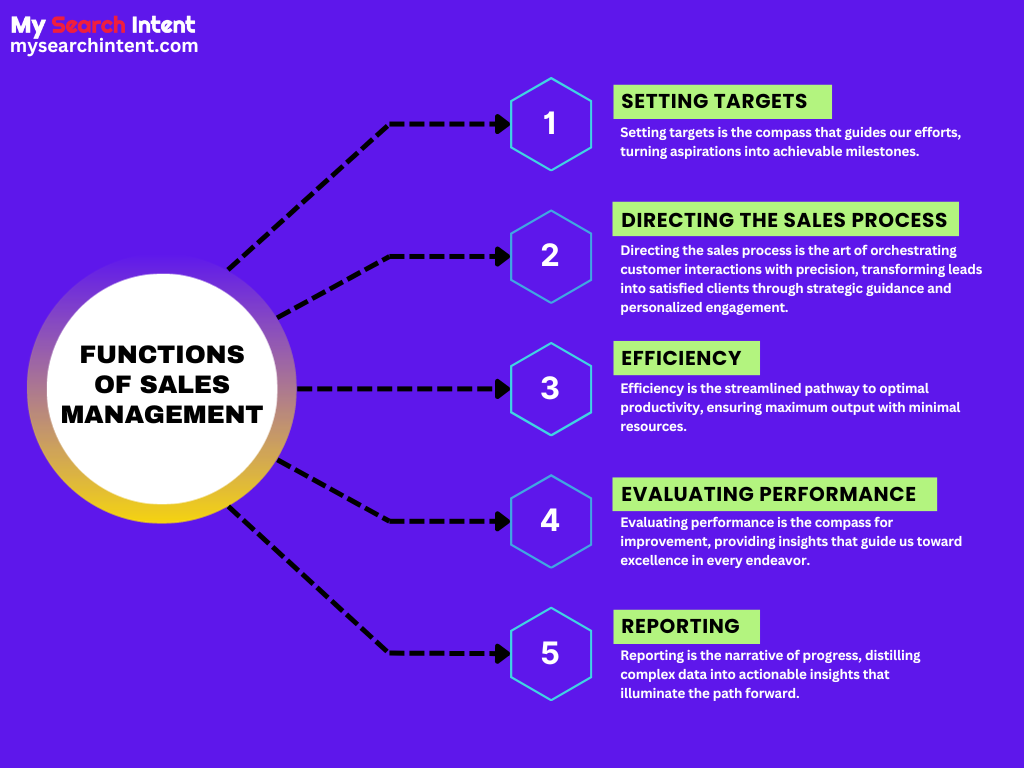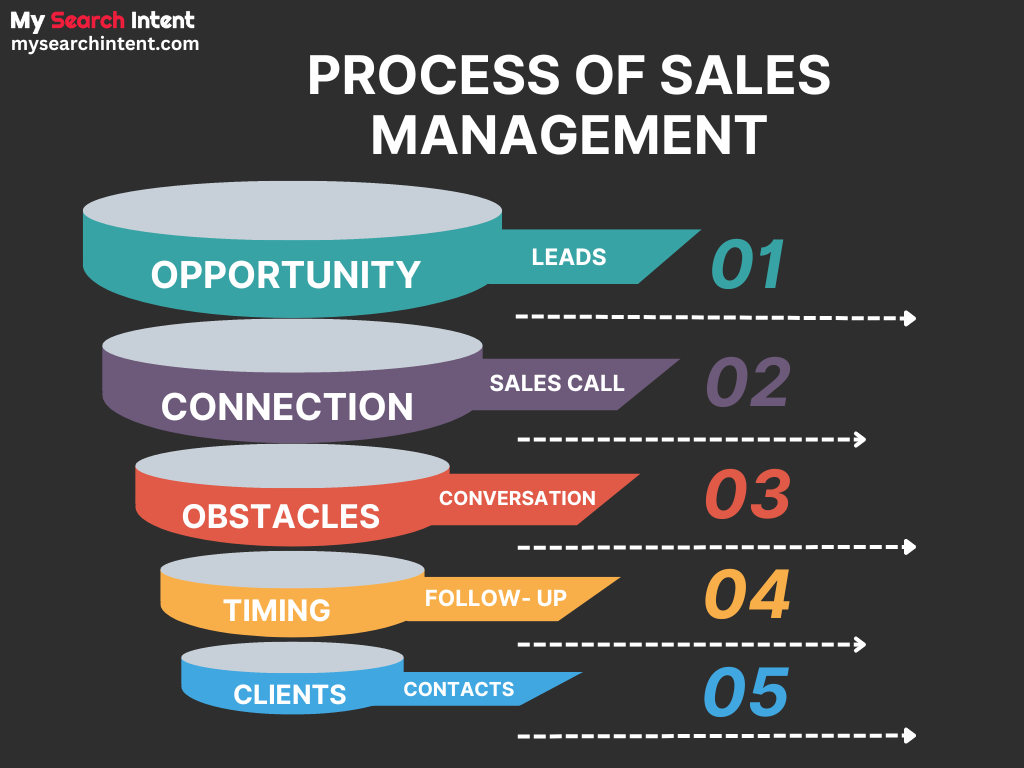Have you ever asked yourself why some companies effortlessly hit their targets? What is the secret sauce behind their business success?
Let me decode it for you!
Just Imagine your company, not surviving, but thriving, consistently hitting those revenue targets, and creating a buzz in the market. How can you achieve that?
The answer lies in effective Sales Management.
Sales Management isn’t just a fancy term, it’s the secret sauce behind transforming dreams into dollars. In this blog, we are decoding the functions of sales management that help boost your efficiency and skyrocket your brand’s influence. Let’s dive in!
Sales Management Meaning
Many people think of sales management as just hitting sales targets or convincing people to buy stuff. That is not true. Sales management is the mastermind behind the scenes. It’s not just about selling, it’s about organizing the entire sales process. From setting strategies to leading the team, it is the brainpower that turns potential chaos into a balance of success.
Sales Management ensures everyone’s playing the right notes at the right time, bringing consistency to the business stage. It includes keeping track of sales as well as your team.
Objectives Of Sales Management
The objectives are as follows:
- Boost Sales Revenue: It helps in increasing overall sales figures. For example- You can implement targeted promotions to boost product sales by 20% within the next quarter.
- Enhance Customer Satisfaction: Ensuring customers are happy with the product or service. For example- You can establish a proactive customer service system to address concerns promptly, aiming for a 95% customer satisfaction rate.
- Expand Market Presence: It increases brand visibility and market share. For example- Launching a social media campaign to reach a wider audience, aiming for a 30% increase in brand mentions.
- Optimize Sales Team Performance: It improves the efficiency and effectiveness of the sales team. For example- You can implement regular training sessions to enhance product knowledge, aiming for a 15% increase in individual sales performance.
- Build Long-Term Customer Relationships: It helps in fostering lasting connections with customers. For example- Initiating a loyalty program to reward repeat customers, aiming for a 25% increase in customer retention over the next year.
- Streamline Sales Processes: Effective Sales management helps in increasing operational efficiency in the sales cycle. For example- You can implement a CRM system to streamline lead management, aiming for a 20% reduction in sales cycle time.
In toto, it isn’t just about selling, it’s a strategic approach to drive revenue, keep customers happy, and propel your business to new heights.

How Important Sales Management Is For A Business/Company
Sales Management is not just about the product, it is about the art of connection. It Is not just about what you’re selling, it’s about the human story you’re crafting as follows:
- People Buy from People: We are wired to connect. Sales Management isn’t just about selling, it’s about building relationships. When customers feel a genuine connection, they’re not just buying a product, they’re investing in an experience.
- Customer Happiness Hub: Ever been blown away by exceptional service? That’s the magic of Sales Management at work. It’s not just about selling, it’s about creating delighted customers who keep coming back, turning one-time buyers into loyal fans.
- Team Empowerment: Your sales team isn’t just a group of individuals, they’re the frontline warriors. Sales Management equips them with the tools and strategies to conquer challenges, nurturing a culture of success that resonates throughout your company.
- Future-Proofing Strategies: The business world evolves, and Sales Management ensures you evolve with it. It’s not just about the present, it’s about future-proofing your strategies, so your business stands the test of time and market changes.
So, it isn’t a corporate buzzword, it’s the fuel pushing your business engine forward.
Do you know Salesforce, a global leader in customer relationship management (CRM), credits its exceptional sales management strategies as a key factor in achieving an annual revenue of over $21 billion?
This industry giant’s success is a testament to the transformative power of effective sales management, showcasing how strategic leadership can push a company to remarkable heights.
However, as a business owner, it is extremely hard for you to take out a few hours of the day! I have something for you! So, here is a list of 5 best sales tools that act like time-saving superheroes, automating tasks and making customers feel like VIPs.
Let’s ditch the long route, not the hard work!
Top 5 Sales Tools For Your Business
1. HubSpot CRM: HubSpot CRM is like having a personal assistant for your sales team, helping organize leads, track interactions, and supercharge your sales pipeline. And guess what? It’s free!
2. Pipedrive: Simplify your sales journey with Pipedrive. It’s like having a GPS for your deals – navigate effortlessly through every stage, from prospecting to closing. It is an affordable gem for keeping your sales process on point.
3. Freshsales: It is affordable yet powerful, you can enjoy features like lead scoring and AI-based insights, transforming your approach to customer relationships.
4. Mailchimp: Your go-to tool for crafting eye-catching emails that convert. It is affordable, user-friendly, and a game-changer for reaching your audience right in their inbox.
5. Salesflare: This intuitive tool automates data entry, leaving you more time to focus on what you do best – closing deals and building relationships.
If you want to take a competitive edge in your industry, use these budget-friendly tools and enhance your customer experience!
After knowing these amazing Sales tools for your business, let’s see the role of Sales Management in a business/company!
Functions Of Sales Management
There are diverse ways in which sales management helps a company/ business to increase its ROI. Let’s see how it works:
1. Setting Targets: One of the main functions of sales management is setting targets and finding the perfect balance – not too high, not too low. It is not just numbers, it is a roadmap to realistic goals.
Explore the sales landscape of the past. What worked, what didn’t? It’s not about staying in history but learning from it to set targets that aren’t just numbers but achievable milestones.
Your sales team is not static, it’s a dynamic force. Consider changes in products, locations, and team composition. By understanding these shifts, you’re not setting targets in a vacuum but adapting to the ever-evolving sales domain.
2. Directing The Sales Process: Sales management isn’t just about hosting, it’s about ensuring each guest gets VIP treatment. In the sea of potential customers, not all stars shine equally. Sales management is your spotlight, identifying the brightest leads who are ready to steal the show. It’s not about quantity, it’s about quality.
It ensures no lead is left waiting in the wings, it’s about timely engagement and making them feel valued.
It’s not just about selling, it is about crafting an experience that turns curiosity into commitment.
3. Efficiency: It isn’t just about finding good leads, it is about fine-tuning the entire process to turn potential into profit seamlessly. Sales management steps in to optimize every move, ensuring a constant flow from curious onlookers to eager buyers. It’s about making the process not just effective but a joy to experience.
No need to juggle every detail, that’s where tech magic comes in. Sales management isn’t about manual headaches; it’s about automating tasks intelligently. If a customer shows interest, let automated systems direct them to the right team or salesperson, ensuring their needs are met efficiently.
It employs automated email systems to seamlessly connect customers with similar products. It’s the personal touch without the manual effort, creating interest and fostering connections effortlessly.
4. Evaluating performance: It is the compass, guiding you through the peaks and valleys of your team’s performance. It’s not just about numbers, it is about recognizing the effort that propels your team forward.
Not every team member walks the same path. Sales management isn’t just about numbers on a page, it is about people. For those facing hurdles, offer a helping hand. Provide encouragement and retraining where needed, transforming struggles into learning curves.
The data speaks, and then it’s time for honest conversations. If despite support, a team member struggles, it’s not the end, it’s an opportunity for clarity. Sales management navigates these waters, recognizing when a different field might be where certain team members truly shine.
5. Reporting: As a sales manager, you’re not just a team leader, you’re a storyteller armed with evidence. Backing decisions with detailed reports transforms information from words to undeniable proof. It is not about hierarchy, it is about leveraging data to make compelling cases.
Sales management understands the nuances of time. It is not just about hitting targets blindly, it’s about setting up sales strategies aligned with the seasons. It is about ensuring your team isn’t selling Diwali decorations in July.
It is not a directive, it’s detective work. It’s about uncovering the “whys” behind the numbers. Why do certain products sell better in specific regions? Why does the team excel at certain times? It’s not just about managing, it’s about understanding the dynamic dance of sales complexities.
After knowing the objectives, importance, and functions of Sales management, you must be wondering what is the process behind it. Let me make it easier for you with the help of an example! Hope it helps!

Process Of Sales Management
Let’s take the retail industry as our guide( you can refer to your industry). Imagine a lively clothing store, eager to boost sales and elevate customer satisfaction. Here are the steps they need to follow:
1. Strategic Planning: Just like a retail store plans its layout for a seamless shopping experience, sales management begins with strategic planning. Goals are set, market analysis is conducted, and a roadmap is crafted to guide the sales team toward success.
2. Team Leadership: Sales management provides leadership, ensuring the sales team is a synchronized group, ready to assist customers and hit sales targets.
3. Performance Evaluation: Just like popular sections in the store, sales management evaluates performance like who is hitting targets, and where are the opportunities for improvement.
4. Customer Relationship Management (CRM): In the retail world, knowing your customers is key. Sales management ensures that the team builds meaningful connections, remembers preferences, and provides personalized assistance. It’s not just selling, it’s creating a shopping experience customers crave.
5. Market Analysis: Understanding what customers want now and anticipating future desires keeps the business ahead of the curve like in the clothing industry knowing the latest fashion trends and then analyzing the market.
6. Communication: In the store, there’s a customer service desk ready to address queries. Sales management acts as this communication hub, promoting open dialogue within the team and ensuring information flows seamlessly.
So, sales management in retail is close to designing a captivating shopping experience!

Conclusion
As we have seen in this article, sales management is a dynamic and multi-faceted role that is a result of strategy, teamwork, and adaptability to make sure that success is the only thing that should be the result for the company. Only when every part of the management knows their job well, will the company achieve the expected result. A synchronized and harmonious team will make up the perfect melody!
It effectively requires a combination of clear communication, the right tools, regular training, and a supportive culture. By implementing these strategies, you can enhance your team’s performance and drive your business toward success.
Have a sales tip or burning question? Drop it in the comments below!
FAQs
What is the role of sales management in marketing?
Sales management plays a crucial role in the symbiotic relationship between sales and marketing, acting as the bridge that connects these two integral components of business success.
The key roles sales management performs are:
Alignment of Goals and Strategies: Sales management ensures that the goals and strategies of the sales team are in perfect harmony with the broader marketing objectives. This alignment is vital for a cohesive approach towards driving revenue and achieving overall business objectives.
Target Audience Definition: It actively contributes to the definition and refinement of the target audience. They provide on-the-ground insights into customer needs, preferences, and pain points, allowing marketing teams to tailor their messages effectively.
Performance Measurement and Optimization: It actively participates in the measurement of marketing campaign performance. By analyzing which strategies and channels are delivering the best results, they contribute to data-driven decision-making for future marketing efforts, ensuring a continuous cycle of improvement.
Communication Hub: Acting as a central hub of communication, sales management ensures a seamless flow of information between the sales and marketing teams. This open communication fosters collaboration and allows for quick adjustments to strategies based on real-time market feedback.
What are the types of sales management?
Sales management can be categorized into different types based on the scope and focus of its responsibilities. The primary types include:
Field Sales Management: Involves managing sales representatives who are predominantly out in the field, meeting clients, and conducting face-to-face interactions.
Inside Sales Management: Focuses on managing sales teams that operate remotely or handle sales through digital channels, such as phone calls, emails, or online platforms.
Key Account Sales Management: Centers around managing relationships with key accounts or major clients, often involving high-value transactions and long-term partnerships.
Retail Sales Management: Pertains to overseeing sales activities within retail environments, such as stores or outlets, with a focus on customer interactions and product placement.
Territory Sales Management: Involves dividing the market into territories and assigning sales teams to specific regions, each responsible for generating sales within their designated area.
Strategic Sales Management: Encompasses planning and implementing overarching sales strategies aligned with broader business goals, often involving market analysis and long-term planning.
What is the scope of sales management?
It encompasses a broad scope within the business landscape. It involves planning, implementing, and overseeing various aspects of the sales process to achieve organizational goals. The key components of the scope of sales management include:
- Setting Objectives
- Strategic Planning
- Team Leadership
- Performance Evaluation
- Customer Relationship Management
- Market Analysis
- Sales Forecasting
- Continuous Improvement


